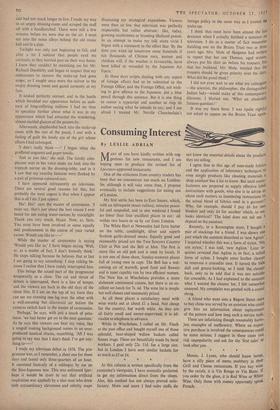Consuming Interest
By LESLIE ADRIAN MANY of you have kindly written with sug- gestions for new restaurants, and I am hoping soon to produce the revised list of Spectator-approved restaurants.
One of the criticisms from country readers has been that we concentrate too much on London. So, although it will .take some time, I propose eventually to include suggestions for eating out of London.
My first sortie has been to East Sussex, which, with an infrequent steam railway, remains peace- ful and unspoiled, and in one weekend I found .no fewer than four excellent places to eat : all within two hours or so by car from London.
The White Hart at Newenden had farm butter on the table, candlelight, silver and superb Scottish garlic-dressed steaks. Equally good and reasonably priced are the Two Sawyers Country Club at Pett and the Bell at Iden. The first is more like an old pub and is used by locals. It is not one of those sham, Sunday-motorist places full of young men in caps. The Bell has a wel- coming air of warmth, good food and flowers and is most capably run by two efficient women. The New Inn at Winchelsea provides a more elaborate continental cuisine, but there is an ex- cellent set lunch for 7s. 6d. The wine list is simple but well chosen and reasonably priced.
At all these places a satisfactory meal with wine works out at about £1 a head. Not cheap for the country, but worth while. As they are all fairly small and owner-supervised, it is ad- visable to telephone in advance.
While in Winchelsea, I called on Mr. Finch at the post office and bought myself one of those splendid, boat-shaped willow baskets called Sussex trugs. These are beautifully made by local workers. I paid only 22s. 11d. for a large size, but in London I have seen similar baskets for as much as £3 or £4.
As this column is written specifically from the consumer's viewpoint, I have normally preferred to get my information direct from the shops. Alas, this method has not always proved satis- factory. More and more I find 'sales staffs do not know the essential details about the product they are selling.
I agree that in this age of man-made fabric and the application of laboratory techniques to even simple products like cleaning materials shop assistant has a lot to know. But until manu facturers are prepared to supply effective labe instructions with goods, who else is to advise u about such matters as laundering instructions 01 the actual blend of fabrics used in a garment Why, for example, should I pay £6 for 0n1 blanket and only £4 for another which, to me looks identical? The label does not tell me. depend on the assistant.
Recently, in a Kensington store, I bought pair of stockings for a friend. I was shown ono pair which the assistant described as 'new Agilon• I inquired whether this was a form of nylon. 'No not nylon,' I was told, 'new Agilon.' Later in: quiries revealed that Agilon is, in fact, a tuftec form of nylon. I bought some leather cleanet to renovate a crocodile case. It turned the hide dull and greasy-looking, so I took the cleanel back, only to be told that it was not suitable for crocodile. As I had explained to the assistant what I wanted the cleaner for, I felt somewhat annoyed. My complaint was greeted with a casual shrug.
A friend who went into a Regent Street store to buy china was served by an assistant who could give him no information about replacement of the pattern and how long such a service took. These are infuriating though reasonably harm• Jess examples of inefficiency. Where an expen' sive purchase is involved' the consequences could be more serious. I suggest in these cases you risk unpopularity and ask for the 'first sales' t0 look after you.
Messrs. J. Lyons, who should know better, have a silly piece of menu snobbery in their Grill and Cheese restaurants. If you buy wine by the carafe, it is Vin Rouge or Vin Blanc. If you order by the glass, it is Red Wine or White Wine. Only those with money apparently speak French.


































 Previous page
Previous page